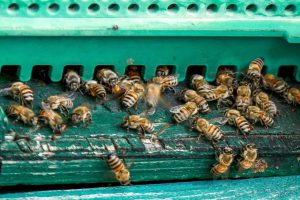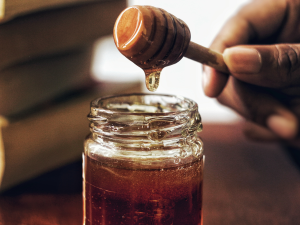Impact of Climate Change on Wild Bees: How They Are Emerging Earlier and What It Means for Pollination
By Paw Mozter
Wild bees are vital pollinators of many crops and wild plants, but they are facing multiple threats from climate change, habitat loss, pesticides, and diseases.
A new study by researchers from the University of Reading has revealed how warmer springs are causing British bees to wake up earlier, potentially disrupting their synchronization with flowering plants and affecting their survival and reproduction.
The effect of temperature on bee emergence

(Photo : KHALIL MAZRAAWI/afp/AFP via Getty Images)
The researchers used a large database of nest materials used by 5,924 species of wild bees over a period of 40 years, and analyzed the relationship between temperature and the dates when bees emerge from their nests, as per Phys.org.
They found that for every 1-degree Celsius rise in temperature caused by climate change, wild bees, such as bumblebees, emerge from their nests 6.5 days earlier on average.
This means that as spring starts earlier and bees become active closer to the start of the year, they may lose sync with the plants on which they depend for food.
This could reduce their chances of finding enough pollen and nectar to survive and produce offspring. It could also affect their ability to pollinate crops effectively, or they may miss crop blossom completely.
The researchers also found that distinct species of bees respond differently to the changing temperature, and that some bees emerge earlier than others.
This could alter the composition and diversity of bee communities and have implications for plant-pollinator interactions.
The implications for crop pollination
The shift in bee emergence could have negative consequences for crop pollination, especially for plants that are heavily dependent on pollination, such as apple trees, as per Daily Mail.
If bees emerge too early or too late, they may not be able to pollinate the crops when they are in bloom, resulting in lower yields and quality.
To prevent this, farmers may need to rely more on managed honeybees, which can be moved around to match crop flowering times. However, this could entail greater costs, which may be passed on to consumers.
Moreover, honeybees may not be able to replace the pollination services provided by wild bees, which are more diverse and adapted to different plants and environments.
To better understand how climate change affects crop flowering times, the researchers have set up a project called FruitWatch, which encourages people to report when fruit trees in their gardens, parks or allotments start to flower.
This could help them monitor how fruit trees respond to changing weather conditions and how this affects their pollination by wild bees.
The study shows that climate change is having a significant impact on the emergence patterns of wild bees in Britain, and that this could affect their survival, reproduction, and pollination services.
The researchers suggested that more research is needed to understand how distinct species of bees and plants cope with the changing temperature, and how this affects their interactions and dependencies.
They also recommend that conservation efforts should focus on protecting and restoring habitats that can provide food and shelter for bees throughout the year.
We are here to share current happenings in the bee industry. Bee Culture gathers and shares articles published by outside sources. For more information about this specific article, please visit the original publish source: Impact of Climate Change on Wild Bees: How They Are Emerging Earlier and What It Means for Pollination | Nature World News








